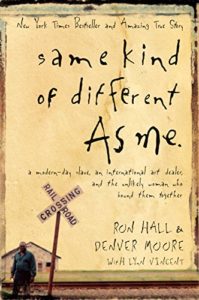“Love is a sadness
Love is a madness
We are the addicts”– Jon Foreman
I love a good cookie. The right combination of butter, sugar and flour create an irresistible concoction to the untamed palate. Not that I am in the habit of eating cookies these days. I disdain them the way anyone with a sugar addiction does – ignoring them and even throwing them into the trash can if given ample opportunity.
Some might think that absurd. Who in their right mind spends hours making cookies only to start throwing them in the garbage?
Years ago, I was a very sad girl who took solace in cookies. I thought that I loved them, but to me, that kind of love was a purely selfish affair. It was utterly one-sided. I hesitated to share (even with my children) and overindulged to the point of misery. Who knew that too much of a good thing was so toxic? The more I ate, the sadder I was. One would think a belly full of cookies would feel fantastic, but alas, it was a sadness. I expected something from cookies they could never give in return; love. The more I confused sensuality with love, the more I felt lost.
I am writing about cookies because, alas, I ate a few too many again this holiday season. But gone are the days I thought cookies would satisfy the longings of my heart. Still, heart-matters are heavy on my mind. I have been thinking about what it means to love and to be loved and how the very experience changes a person. When I was 18, my mother told me I didn’t know what love was. I thought it was a feeling–and a very powerful one at that. Alas, that was just smoke and mirrors compared to what I have known of real love since then.
Love isn’t hormones. It isn’t a big, fluffy teddy bear or a dozen red roses. It isn’t negligees or heart-palpitating kisses on the bank of a river at midnight. I dare to add, many of our misconceptions about love come from movies.
 Last night I was mesmerized by “Shall we Dance”, a Fred Astaire and Ginger Rogers film. In the movie, Peter (Fred) falls in love with Linda (Ginger) after he sees a photograph of her. In one of the most ridiculous plot points of all time, they get married to prove to the public they are NOT married by getting a divorce. They “fall in love” in the process. (My husband walked in half-way through the movie and asked me what it was about, but I couldn’t say – that’s how badly the plotted the movie was. But the songs and dance routines were exquisite–especially the ballet sequence at the end with Harriet Hoctor, who performed an elliptical backbend en pointe.)
Last night I was mesmerized by “Shall we Dance”, a Fred Astaire and Ginger Rogers film. In the movie, Peter (Fred) falls in love with Linda (Ginger) after he sees a photograph of her. In one of the most ridiculous plot points of all time, they get married to prove to the public they are NOT married by getting a divorce. They “fall in love” in the process. (My husband walked in half-way through the movie and asked me what it was about, but I couldn’t say – that’s how badly the plotted the movie was. But the songs and dance routines were exquisite–especially the ballet sequence at the end with Harriet Hoctor, who performed an elliptical backbend en pointe.)
The song, You can’t take that away from me, was beautiful, but in the context of the movie, it made no sense. Peter and Linda were being manipulated as a publicity stunt and we were supposed to feel sorry for them. They were obviously more impressed with themselves than they were with each other and therefore wholly unsympathetic. Why do I mention all of this? Well, because Hollywood probably had a more accurate portrayal of love via “The Love Bug” than it does in most of its romantic comedies. Why?
Love is not arrogant.
I grew up thinking love was all about me and the way I felt. Big romantic gestures only happened because I wanted something in return. They were wholly selfish. Maybe that is why I struggled to know a God who was self-sacrificial. I thought Jesus came to earth to save me because I was so awesome, not because I was utterly depraved and foolish and needed saving. In the most gracious act to me as a wayward child, God allowed me to eat as many cookies as I wanted in order to see how helpless and hopeless I really was. He allowed me to feel lonely and sad in order that I might cry out to Him so that He might show me what true love is.
What love really means
Perfect love casts out fear because it gives the receiver confidence. Perfect love says that no matter what is done to me, I will still love in return. This takes strength and courage and tenacity. This is no wimpy love! It is mighty and strong. It bears all things, believes all things. Love never fails. That is because it frequently sacrifices its own comfort for the beloved. And in order to truly love, the lover must often overlook and forgive offenses that cause grievous harm. I believe we all want to be loved in this way, but we frequently fall short when we try to live it out.
 One of the most powerful stories I’ve read about love is from the book, “The Same Kind of Different as Me.” It is the story of a homeless man who is loved by a married woman who volunteered at a soup kitchen in his neighborhood. She showed him the love and kindness he had never known, and he couldn’t understand it. There was no earthly reason for a married white woman to care for a homeless black man, but she did. And it changed him forever. Her love gave him confidence.
One of the most powerful stories I’ve read about love is from the book, “The Same Kind of Different as Me.” It is the story of a homeless man who is loved by a married woman who volunteered at a soup kitchen in his neighborhood. She showed him the love and kindness he had never known, and he couldn’t understand it. There was no earthly reason for a married white woman to care for a homeless black man, but she did. And it changed him forever. Her love gave him confidence.
A friend of mine recently divorced her husband of several decades. They didn’t get along and were tired of slogging it out. Besides, she has a good male friend who she is quite attached to. He is her “best friend”. It matters not that he is married. They don’t get along either. He is planning to divorce his wife so they can be together forever. Or so they think. They have even convinced themselves this is “God’s will.” Adultery is, after all, a forgivable offense. But I venture to guess, if they were unable to self-sacrificially love their first spouses, they will not be able to love their second (or third) spouses any better. Their kind of “love” is all about pleasing themselves and has little thought for how it will affect anyone else (not their children, or their parents or their friends or family). What’s “for better or worse” or a stupid vow got to do with marriage anyway? We change spouses like we change our underwear. If it starts to chafe, toss it in the trash.
Love is…not a cookie. In its highest form it transcends feelings or emotions. Or as the apostle Paul wrote in his letter to the Philippians:
“Do nothing from selfish ambition or conceit, but in humility count others more significant than yourselves. Let each of you look not only to his own interests, but to the interests of others. Have this in mind among yourselves, which is yours in Christ Jesus, who, though he was in the form of God, did not count equality with God a thing to be grasped, but emptied himself, by taking the form of a servant, being born in the likeness of men. And being found in human form, he humbled himself by becoming obedient to the point of death, even death on a cross.” – Philippians 2:3-8
First and foremost for a Christian, love is obedience to God. It is our highest form of worship. And until we learn how to obey, we can never love as He loves us. So, with the new year upon us, let’s put down our cookies and take up something beautiful and worthwhile – a love that transcends sugary concoctions – a love that fulfills and satisfies – a love that sets aside self and dies for the beloved.
Leave a Reply